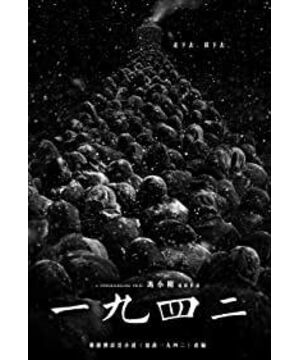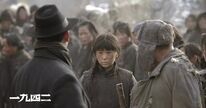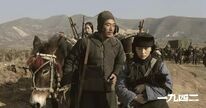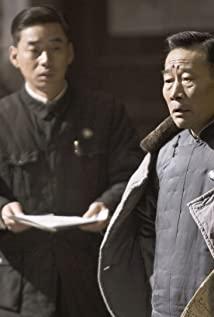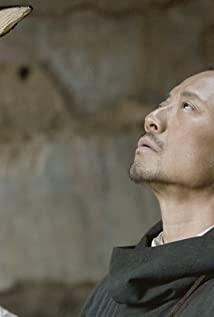As an art of expressing ideas through images, in my opinion, film has two types: objective expression and objective + subjective expression. "1942" takes Feng Xiaogang's words and uses Liu Zhenyun's novel to tell people today - "Where did our nation come from, and why did we become what we are today." Such a grand proposition, it can be seen that Feng Xiaogang's this The second is to make a fortune from the early market comedy, to the ambition to fight against the national suffering after "Assembly" and "Tangshan Earthquake" control historical themes. However, after watching "1942", I only saw Feng Dao's ambition, but not his ambition, sincerity or even sincerity. Throughout the entire viewing process, I couldn't find the answer to his question. You know, it was because of this question that I was looking forward to "1942".
Director Feng is being objective this time. He is only bloody for blood's sake, ugly for ugly's sake, and miserable for tragic's sake. His eyes are full of limbs blown away by cannonballs, skinned cats, disintegrated donkeys, and... (The description that affects everyone's perception is omitted here). Of course, any kind of national suffering is indispensable, especially the natural and man-made disasters such as the 1942 famine in Henan, which is indispensable. It is indispensable to sell yourself, children and wives for a meal like in the film, but the problem is, After showing these things, what do I want to tell you, is it that people are only numb after going through hardships? Without dignity? Are you going to steal your life? In the past few days, the topic of whether there is dignity in the state of starvation has started to be discussed on the Internet. I think this is a problem of jade and tiles, and I will not express it here. Think about how the humanitarian crisis is represented in "Schindler's List". In "Life is Beautiful", the father and son are in a Nazi concentration camp. The father still tells the son that he is playing a game, and he is still instilling a steady stream of beauty. things, believe in good things. In "1942", when the priest saw the Japanese bombing and the people fleeing the famine had nowhere to escape, he ran to ask the priest, "Where is God, why doesn't God care?" The priest said, "These are the devil's doing, and God knows it all. ." Zhang Hanyu acted like an angry youth in this scene, "Why do I still believe in God, I think I also have a devil in my heart." At this point, the faith has also been shaken.
I am quite puzzled, why did Director Feng have to arrange the element of faith in the many clues such as the Kuomintang's foreign policy, the Japanese army's plan of aggression against China, and the chaos in the internal affairs of Henan Province. If the 800 million box office is bigger and stronger, then he should also study the Western understanding of faith - what matters is not what you believe in, but that you still have faith after suffering. If you want to prove the impact of disasters on the soul, it is a step backward in means compared to "Assembly" and "Tangshan Earthquake". In these two films, after the suffering of human nature, there is still persistence and warmth. Otherwise, the company commander played by Zhang Hanyu would not spend the rest of his life looking for evidence to give an explanation to the brothers, and Fang Deng, played by Zhang Jingchu, would not return to the earthquake rescue scene, which was a nightmare for her.
Our nation has experienced a lot. What matters is how to face life after a disaster, and what attitude to take to confront life. This time, Director Feng just proved that with a high-tech large production team, it is possible to shoot tragic scenes and unrestrained scenes, but it lacks due feelings.
The feelings of the works of art are actually the position and attitude of the author -
it is the scene in which Da Vinci chose the twelve disciples for a dinner in The Last Supper, and abandoned Jesus' crucifixion on the cross;
when Zheng Banqiao painted bamboo, there was nothing in his eyes. Bamboo, a kind of care with confidence;
it is the fate symphony "no one is wrong" composed by Shen Congwen in "Border Town";
it is the emotion of nature before the sunrise and when the flowers are blooming; it
is the so-called most beautiful in aesthetics. Inclusive moment.
"Youth PI" is a sentimental film. When PI smashed the big green fish to death with an axe, he burst into tears and said to the fish: "I'm sorry, I'm sorry, thank you for turning into a fish and saving us." , PI does not understand why the Virgin Mary sent Jesus to save the world, and cannot understand why innocent people are sacrificed to save the world. However, in order to survive, the PI who does not kill, wants to use his innocent life to satisfy his long-distance companion - a tiger. Isn't this a fable of getting along with people and living with oneself? !
In the film of more than 120 minutes, Ang Lee used the first 100 minutes to describe the adventures and survival of PI. If the film ends here, it is at best a sea adventure, no better than "The Rest of the Desert Island" and "Journey to the Center of the Earth". Where is Gao Ming, 3D special effects can't be compared with "Avatar", but Ang Lee, who has filmed "Food and Man", "Broken Arm Mountain", "Lust and Caution", he never only tells stories, he always tells Life. "Diet Men and Women" talks about cooking on the surface, but actually talks about the fatigue of life; "Broken Arm Mountain" talks about comrades on the surface, but actually talks about people's conditions; "Lust and Caution" talks about revolution, faith, desire, and more man's loneliness. This time, it is still an objective + subjective expression, but it is hidden deeper and less visible. My nerves were tense when PI was telling the second story, and in less than 5 minutes, PI understated the harsh reality, the camera was always on the white wall behind PI and the faces of two Japanese people wander. At this point, the pattern of the film has been opened. The scene of cannibalism exists in PI's memory, and it has never been filmed. The tip of the iceberg is even more chilling. This kind of trickery seems to open a window in the audience's heart, attracting everyone to stick their heads and peep into their hearts and souls.
Anyone with a bit of experience can judge what PI has really experienced, and can better understand how to survive without those wonderful fantasies during the 220-day rafting. How open-minded do you have to be to turn corruption into magic. The middle-aged PI asked the writer calmly: "Which story do you like?" The writer said, "The one with the tiger". PI said: "You follow God". At this moment, I and the PI on the screen looked at each other and smiled knowingly. PI's belief is still there. Therefore, he has harvested happiness and can still live a peaceful and powerful life. Movies have always been an insinuation of the director's "three views", and this kind of feeling was brought to us by Ang Lee.
Walking out of the movie theater with my daughter, my daughter was still excitedly immersed in those imaginative pictures. I praised PI with her for her bravery, wit, and tenacity, but I kept thinking about the adult world of sailors, cooks, mothers, and PIs. Everyone has a tiger in their heart. It depends on how you get along with him. This is the subtlety of Ang Lee, and everyone has their own answer when they see it.
———————————— Love to watch ——————————————
WeChat public number: aikanai
My original movie fan account loves to watch. Let's chat
with experiences that belong to you, those laughs, tears, and heartbreak...
The movie opens a window,
we see life, and we also see self.
Original movie reviews, independent movie recommendations.
View more about Back to 1942 reviews


